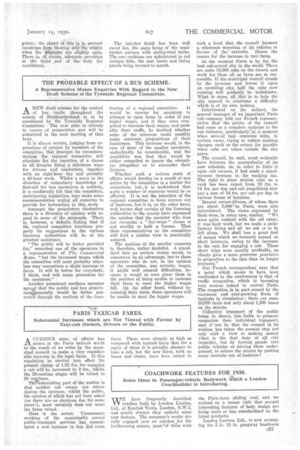THE PROBABLE EFFECT OF A BUS SCHEME.
Page 59

If you've noticed an error in this article please click here to report it so we can fix it.
A Representative Makes Enquiries With Regard to the New Draft Scheme of the Tyneside Regional Committee.
ANEW draft scheme for the control of bus traffic throughout the county of Northumberland is to be considered by the Tyneside Regional Committee. The new plan is already in course of preparation and will be submitted to the next meeting of that body.
It is almest certain, judging from expressions of opinion by members of the committee, that amongst its recommendations the regional committee will stipulate for the insertion of a clause in all licences fixing a minimum wage for drivers and • conductors, together with an eight-hour day and probably a 48-hour week. Whilst a move in the direction of compulsory knowledge of first-aid for bus operatives is unlikely, it is confidently felt that the committee, anticipating legislation, may make some recommendation • urging all concerns to provide for instruction in this.work.
Amongst the proprietors themselves there is a diversity of opinion with regard to some of the proposals. There is, however, a definite feeling that if the regional committee functions properly its suggestions to the various licensing authorities will be of the greatest assistance.
"The public will be better provided for," remarked one of the operators to a representative of The Commercial Motor, "but the increased wages which the committee will most probably stipulate may necessitate a slight increase in fares. It will be better for everybody, I think, and will mean protection for the operators."
Another prominent northern operator agrea that the public and bus proprietors ' generally would be better protected through the medium of the func tioning of aregional committee. It
would be unwise for operators to attempt to raise fares in order ta pay higher wagei, and if they were compelled to increase their wages, and probably their staffs, he doubted whether some of the concerns could possibly make economic propositions of their businesses. This increase would, in the ease of some of the smaller operators, undoubtedly be considerable, and the possibility was that they would be either compelled to ignore the committee altogether or to surrender their licences.
Whether such a serious state of affairs would develop as a result of any action by the committee is a matter for conjecture, butit is understood that quite a number of concerns would be so affected. It is not the intention of the regional committee to force anyone out of business, but it is, on the other hand, well known that certain of the licensing authorities in the county have expressed the opinion that the operator who does not recognize a " fair-wage " clause is not worthy to hold a licence. That their representatives on the committee will hold a similar view is practically assured.
The position of the smaller concerns is, therefore, rather doubtful. A standdard fare on certain routes would, in someways, be an advantage, but to those operators who do not, in the opinion of the committee, pay suitable wages, it might well present difficulties, because it would at once place them in the position of being unable to increase their fares to meet the higher wages bilL On the other hand, without increasing their fares, those operators will be unable to meet the bigger wages.












































































































